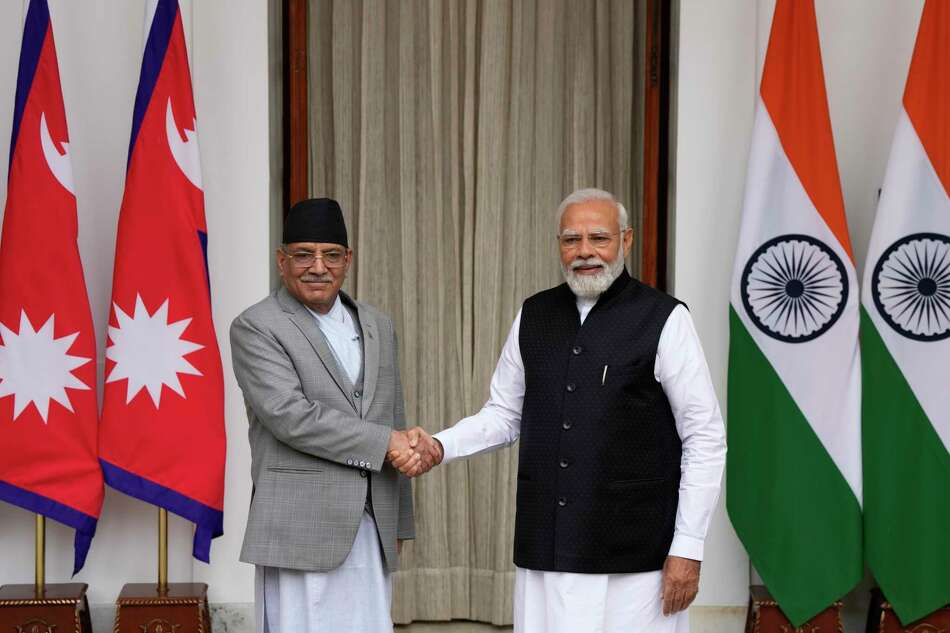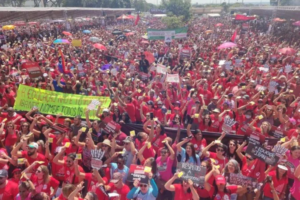
INDIA: Visit of Prachanda, prime minister of Nepal and new agreements between both countries
The Prime Ministers of India and Nepal, Narendra Modi and Prachanda, friendly greet each other in the meeting they had today. Source: The Telegraph
Yesterday the Prime Minister of Nepal, Pushpakamal Dahal, known as Prachanda, began his visit of four days trough India. Prachanda is Prime Minister since December of last year, and its the third time since he betrayed the struggle of the Nepalese people, ended the People’s War, and turned into an infamous traitor of the revolutionary cause of the people. Today he had a meeting with the Prime Minister of the Indian State, Narendra Modi, and Prachanda has invited him to visit Nepal in the upcoming time. It’s not the first meeting or encounter of high level between both governments during this year. Recently there was held a summit for economical cooperation in order to strength commerce and economical investments. Besides that, since last year the State of Nepal has increased its link to the Indian State regarding importation and exportation and Indian investments in Nepal has been increased, specially in energy projects.
Regarding the signed agreements, until now there are known several relevant details on economical matters: it has been agreed to make the commercial transactions between both countries easier using QR codes; some parts of railways and pipelines between both countries has been officially inaugurated. Also India will buy 10.000 megawatts of electricity from Nepal in the next 10 years, and there will also be a new joint investment for constructing a line for transporting electricity. This investment will be held by Nepali State-owned company Vidyut Utpadan Company Limited (VUCL), and a big Indian company, NPHC Limited. 51% of the ownership of this project will be held by the Indian company. This big investment of energy infrastructure will take three years to be built.
Years ago, the CPN(M) [Author’s note: original party lead by Prachanda during the People’s War, and after that suffered many splits, unifications and changes in its name] with its Revolutionary United Front, stated in their Common Minimum Policy and Programme in 2001 that “liberating national industries from the grip of imperialism and particularly Indian monopoly capital” was necessary and the “Stranglehold of Indian monopoly capitalists in the commerce sector shall be ended” [Author’s note: points 40 and 44 of the Program]. Regarding the foreign policy, they mentioned that “Indian expansionism is the principal external enemy and threat to Nepal and all countries of South Asia” [Author’s note: in point 71 of the Program]. After this, in a Plenum of the Central Committee of 2004, Prachanda personally prepared a document which made “a lengthy historical explanation over the process of expansionist intervention of the reactionary Indian ruling class over Nepalese nationality, geological integrity, economic self-dependency as well as over political and cultural freedom”. After this part, regarding the Indian capitalists, he specified: “The Indian monopoly capitalist rulers, who have always backed destabilization and anarchy in Nepal”.
Linked to all of this matters, also the so-called “Peace and Friendship Agreement” of 1950 is pending to be discussed, on which Modi said that Prachanda and him are in conversations to continue stretching their ties and cooperation. In the Program we mentioned before, it was stated that this agreement of 1950 was part of the “semi-colonial and neo-colonial treaties and agreements (…) imposed by imperialism and expansionism upon the country shall be nullified and the country shall be made fully sovereign, independent and self-reliant [Author’s note: point 7 of the Program].”
In the past there were already critiques by revolutionaries to these political links of Prachanda with India, because these had not started now, but in 2008-2009 with meetings of Prachanda with the party of Modi, the BJP. Communist Party of India (Maoist) [CPI(M)], wrote an open letter in 2009 highlighting the specially good links with the party of Modi, which was and is characterized until now by CPI(Maoist) as Fascist. Also, Prachanda and CPN(M) were criticized because these Indian bourgeois parties were the same who previously were enemies, parties of the “Indian ruling classes”, of “Indian expansionism”, and “reactionary forces” [Author’s note: in the Open Letter of CPI(Maoist), this can be seen in the point named “On UCPN(M)’s understanding of Indian Expansionism”].
Truly this shows how the renegades of the revolution turn into lackeys of imperialism and enemies of their own people.

